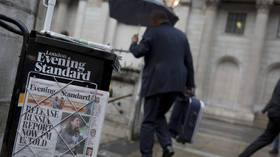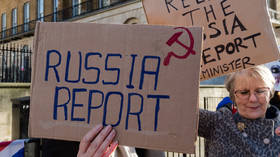‘Russia Report’: Once-mighty British intelligence has been reduced to regurgitating sensationalist Buzzfeed stories

The ‘Russia Report’ gives us an insight into the dearth of genuine expertise available to British officials on Russia. It also introduces a new style of investigation: Seeking evidence to support predetermined judgements
On Tuesday, the British Parliament’s Intelligence and Security Committee issued a 50-page report detailing its views on the danger Russia poses to British security. “The security threat posed by Russia,” the report says, “appears fundamentally nihilistic… It is clear that Russia poses a significant threat to the UK on a number of fronts – from espionage to interference in democratic processes, and to serious crime.”
The report further argues that the British intelligence community “took their eyes off the ball” and the government “badly underestimated the Russian threat.” In particular, the government and its intelligence agencies failed to investigate claims that the Russian state had interfered in the 2016 Brexit referendum. The government, however, has rejected the committee’s demand that such an investigation now take place.
The reports’ claims are alarming at first glance. When examined, however, they can be seen to lack evidentiary support. Instead, readers are repeatedly told that there have been “widespread allegations” and that “it has been widely reported” that the Russians are up to no good. But allegations are not evidence, and time after time the report fails to substantiate the suspicions it raises.
For instance, the report declares, “There have been widespread public allegations that Russia sought to influence the 2016 referendum on the UK’s membership of the EU.” But the only evidence it provides to show that those allegations might be true is a reference to “open source studies” which point to pro-Brexit bias by the Russian broadcasters RT and Sputnik.
The committee neither names the studies nor discusses whether their conclusions are valid. Apparently, the committee asked MI5 for evidence, but all it got in reply was “six lines of text” based also on ‘open source studies’. In short, no secret intelligence supporting the claims that Russia interfered with Brexit has been provided.
This is rather embarrassing. The committee has drawn a blank. But still, it presses on. “There has been credible open source commentary suggesting that Russia undertook influence campaigns in relation to the Scottish independence referendum in 2014,” it announces. The relevant footnote fails to say what this credible commentary is. Instead, it merely says that it “was widely reported” that Russians who had observed the Scottish referendum had suggested “that there were irregularities in the conduct of the vote.”
But Russians complaining about the conduct of the vote do not constitute Russians trying to influence the campaign. After all, the observers in question said these things after the vote, and so their statements could hardly have been an attempt to affect the outcome.
This faulty mode of argument is pretty much par for the course. “It has been widely alleged” that Russia was responsible for a computer hack on the French presidential election in 2017, the report says. “It has been widely reported” that Russians were responsible for the hack and leak operation against the Democratic National Committee in the US in 2016. And so on.
Perhaps the nadir of the report is the statement that “on 15 June 2017, Buzzfeed News published the results of its investigation into 14 deaths in the UK of Russian business figures and British individuals linked to them” (Buzzfeed implied, without supporting evidence, that all 14 people were murdered by the Russian intelligence services). This, then, is what the might of British intelligence has been reduced to – regurgitating sensationalist stories from Buzzfeed. It gives you a sense of what the committee considers a ‘credible’ source to be.
The committee goes beyond repeating unsubstantiated claims to making unspecified ones. In the UK, it says, numerous “lawyers, accountants, estate agents, and PR professionals have played a role, wittingly or unwittingly, in the extension of Russian influence which is often linked to promoting the nefarious interests of the Russian state.” No names are named, no evidence produced. All the committee provides is a quote from long-time anti-Russian campaigner William Browder, as if his bold assertions amount to incontrovertible proof.
Also on rt.com ‘No evidence of successful interference’: UK govt rejects new 'Russia & Brexit' probe after Parliament report on alleged meddlingIn 50 pages warning us of the evil ‘influence’ Russia has over the UK, the report fails to provide a single documented example of this influence at work. In short, the entire premise of the report (that Russia poses a significant threat to the UK) is not only not proven, but also not even demonstrated in any tangible way.
That perhaps explains why the committee has chosen to be so harsh on the British government, accusing it of failing to live up to its responsibility to defend the nation. It appears that the committee knows in its bones that all these things are true, but also knows that it lacks any evidence to prove them. The evidence is there; it’s just that the government has failed to do its job and provide it.
A proper intelligence investigation first finds the facts and then comes to a conclusion. It would seem as though the Intelligence and Security Committee wishes to go about it the other way – it has already reached its conclusion; now it wants the government to provide the evidence. The government should not indulge this.
Think your friends would be interested? Share this story!
The statements, views and opinions expressed in this column are solely those of the author and do not necessarily represent those of RT.














